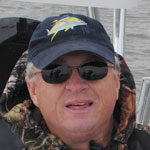
General Assembly should pass bill to protect red drum, spotted seatrout and striped bass from commercial harvest
The North Carolina General Assembly has in its possession a piece of legislation that could drastically change the way saltwater fish are managed in the state’s coastal waters.
The bill, HB 353, commonly known as the “game-fish” bill, would prohibit any future commercial harvest and sale of striped bass, redfish and spotted seatrout (speckled trout) from North Carolina waters.
The bill, which currently appears bogged down in political maneuvering, has until June 9 to be voted through the House of Representatives to the Senate, or the hopes for its passage will end.
This is legislation that, in the opinion of North Carolina Sportsman, is long overdue.
Over the past year, it has become clear that recreational fishermen cannot trust the North Carolina Marine Fisheries Commission – dominated by commissioners friendly to commercial-fishing interests – to act in the best interest of the fishery when there’s commercial-fishing money on the table.
This was never more evident than this past February, when the Commission voted – with dissent only from holders of recreational seats on the Commission – to extend through June 15 a recreational closure for speckled trout caused by extensive cold-weather kills last winter, while at the same time allowing commercial netting of specks to resume.
A second piece of evidence was the Commission voting to allow commercial trawlers to continue to take striped bass after several huge trawling-related striper kills in January.
The only way to take the NCMFC out of the equation is through legislation that forces its hand.
That’s what HB 353 promises to do.
In addition, the bill pays mitigation to commercial fishermen for potential lost income over a period of time. That’s really not a lot of money, because redfish and speckled trout account for only two percent of the annual commercial catch and less than 100 commercial fishermen count on those two species to provide more than 10 percent of their income.
HB 353 really should be considered a jobs bill, not a fisheries bill. Why? A look at more NCDMF statistics explains.
It’s estimated that the commercial fishing industry generates $80 million annually for North Carolina’s economy. Recreational fishing generates $1.6 billion; more than 800,000 recreational saltwater fishing licenses were sold last year. Gov. Bev Perdue herself, a longtime protector of commercial-fishing interests, used similar statistics when presenting the case to the federal government that funds were needed to dredge and keep Oregon Inlet passable for fishing vessels.
And with redfish, specks and stripers protected from commercial harvest and sale, a markedly improved fishery would doubtless add to that total with an increase in tourism and jobs.
North Carolina is one of the few states left on the South Atlantic or Gulf coast that allows any commercial sale of redfish or specks. Go to Florida, South Carolina or Louisiana, where reds and specks are protected, and it won’t take more than one or two fishing trips to convince you that game-fish status is a boon for the fishery and recreational fishing in general.
If a game-fish bill isn’t passed soon, a lot more fishermen from North Carolina will be taking trips to South Carolina and other states to spend their dollars and catch their fish.
That’s the message that recreational fishermen need to take to their state representatives and senators over the next week, as the fate of the game-fish bill rests in their hands.
A quick trip to the North Carolina Camo Coalition’s legislative action page will allow you to determine who your state representative or senator is and send e-mails supporting HB 353.


Be the first to comment